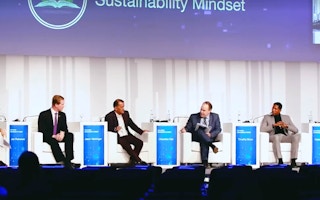Decarbonisation claims by corporations are flawed, claimed Chandran Nair, fifteen minutes into what turned into a tense panel discussion on the biggest drivers behind people’s understanding of sustainability at The Future Sustainability Summit, held as part of Abu Dhabi Sustainability Week.
“Our entire world is based on carbon. When a company says it’s achieved a three per cent reduction in carbon, it’s not decarbonisation—it’s merely taking inefficiencies out of their carbon usage,” he said, calling decarbonisation “jargon” that was being used by companies to portray themselves as responsible actors.
His comments followed fellow panelist Timothy Nixon, managing editor of sustainability at Thomson Reuters, who shared research showing that more companies in the world were transforming their business models in a bid to “decarbonise in line with a 2 degree world.”
On the role of business in solving the world’s sustainability challenges, Nair, the Malaysian author and founder of Hong Kong-based think tank The Global Institute for Tomorrow, continued: “Sustainability is a public and common good, which is not the purview of private entities. That doesn’t make them bad, but this is not what they do.”
According to Nair, companies can only play a role in environmental management if tough regulations are in place, which requires governments to wield a stronger hand in pricing the negative effects of production, such as pollution, and limit consumption-driven growth. In his latest book, The Sustainable State, he writes that a strong, sustainable state “will need to treat resource management as the centre of economic planning, rather than as an afterthought to growth, consumption, and production.”
“The rules are not made by Nike, Apple or Amazon. And if government regulation fails, because it serves private interests, this is why we are where we are,” said Nair, pointing at the dire state of environmental degradation.
He added: “This is why we don’t have a global price of carbon. This is why the Paris climate accord has no traction at all.”
Based on a live poll that ran during the panel, 52 per cent of the audience found business leaders to be the top drivers of sustainability, followed by celebrities at 32 per cent, showing the public’s lack of faith in other players such as government and civil society groups to influence sustainability.
Sharing the stage with Nair and Nixon were Jason Meininger, senior vice president of Expo 2020 Dubai, the six-month long exhibition held in selected countries every five years, and Hassan Pierre, co-founder of luxury fashion brand Maison De Mode, who’s idea of a top down approach to creating a sustainability mindset differed starkly from that of his co-panelist.
“The way to lead is often from the top down so we really like to introduce sustainability through the luxury market before influencing the more mainstream fashion consumer,” said Pierre, who referred to celebrities as the ones whose opinion is valued and trusted in today’s world.
On his own business model, he shared: “We believe that if there’s a t-shirt that saves a thousand lives but doesn’t look good, nobody is going to buy it.”
Towards the end of the panel, Meininger, tried to bring his fellow panelists together by talking about the collaborative aspect of next year’s “Connecting Minds, Creating the Future” Expo 2020, in which sustainability is a sub-theme, along with mobility and opportunity.
What is important is that different stakeholders work together on scalable solutions to the world’s most pressing challenges, even if progress was slow, said Meininger in an effort to conclude the discussion on a positive note.
To which Nair retorted: “Have you seen the IPCC report? We don’t have time dude, that’s what I’m telling you. Read the science!”

















